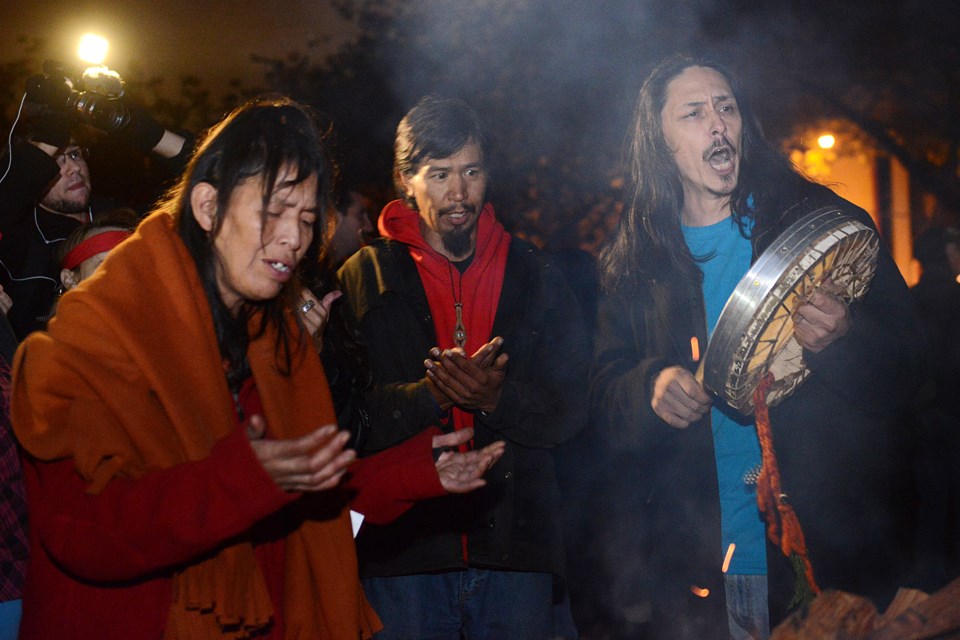Dozens of campers at Oppenheimer Park remained at the tent city Thursday morning despite a court-imposed deadline that required people to pack up and move out at 10 p.m. Wednesday night.
The campers' defiance came the same day that police confirmed the body of a 69-year-old camper was found in one of the tents. Police don't believe his death was suspicious.
The man's death cast a pall over the camp Wednesday night, where campers gathered around a fire in the park to sing and continue what organizer Dan Wallace called a peaceful protest.
"You're standing here to be dignified and don't let anybody take your dignity away," Wallace told a large crowd moments before the 10 p.m. deadline came into effect.
As the deadline passed, three police officers accompanied a fire offical into the park but turned back after a group of protesters converged on the quartet, shouting "homes, not jails."
The Vancouver Police Department and Vancouver Fire and Rescue Services parked their command trucks on Powell Street overnight but there were no arrests made and the fire was left to burn.
"We're going to remain down here monitoring the park," Const. Brian Montague, a VPD media liaison officer, told reporters Wednesday night. "We're going to encourage people to continue complying with the court order to pack up their belongings voluntarily and leave the park."
Police moved into the park Thursday morning to oversee the dismantling of tents. Observers from the Pivot Legal Society and community activists monitore the police, who accompanied park rangers, firefighters and park board general manager Malcolm Bromley as they went tent to tent. Some police were equipped with cameras. Staff from the city's housing department was also on scene to help people find shelter.
About 100 tents were still pitched in the park but it was unclear how many were occupied. Camper Gary Humchitt, 40, said he won't leave the park until someone finds him permanent housing.
"I'm willing to get arrested," said Humchitt, who fled a home in Courtney earlier this year because of issues he preferred not to share with the Courier. "But really — they're going to arrest me, a homeless guy?"
The former construction worker said he hurt himself on the job but has been unable to get a disability income from the government. Humchitt said he refused to move to a shelter or temporary housing, saying the purpose of the tent city has always been about getting permanent housing.
"I want something reasonable," he said
Deputy city manager Sadhu Johnston told the Courier Wednesday that about 50 people in the park were considered homeless. Johnston said there was enough shelter and housing available for the campers.
"We could put them in a bed right now," Johnston said. "It may be a mat on the floor but it's inside."
Various stories were going around the camp Wednesday that shelter space wasn't available, with a cable television crew phoning the city's 211 shelter number to hear that Union Gospel Mission had seven spaces left at 11 p.m.
Camper Daniel Lefebvre, 39, was busy packing up his tent and belongings late Wednesday night after he said an outreach team at the Carnegie Centre helped him find permanent housing in an old hotel on Granville Street.
He wouldn't disclose the name of the hotel but said he was glad to find a place to live after camping in the park since the tent city was set up in July. He said he became homeless after he lost his place in Surrey after he and his girlfriend separated.
"Now I've got my own place, with my dog, with my own lock and key," said Lefebvre, a recovering drug user who is on a disability income. "Today's a great day."
Wendy Pedersen, a longtime Downtown Eastside community activist, said she spoke to about a dozen younger campers who planned to move to three different parks. She said one of the campers is a veteran of the Afghanistan war and suffers from post traumatic stress disorder. She wouldn't disclose the parks but said the campers don't want to move into a shelter, as suggested by the city.
"It's not a humanizing place being in a shelter," said Pedersen, standing on the edge of the park early Thursday. "You lose your privacy and your choices."
Mayor Gregor Robertson held a news conference Wednesday to publicly express his condolences to the family and friends of the man who died in the park.
Robertson called the man's death a tragedy and he said it demonstrates why tent camps are not safe, particularly for older people. Court affidavits filed by a police officer, an assistant fire chief and senior city staff to acquire the court injunction from the B.C. Supreme Court detailed concerns about crime, fire hazards and safety of campers.
The mayor pointed out the city had already moved more than 100 people into shelters and housing prior to the 10 p.m. deadline to vacate the park. He said more than 400 new permanent housing units will open in the city before the end of year.
"So there's a lot housing coming available and we're hopeful that we see a peaceful resolution to this," said Robertson, noting tent camps "typically take some time to take down."
Added Robertson: "The city's approach is compassionate and very balanced."
twitter.com/Howellings



